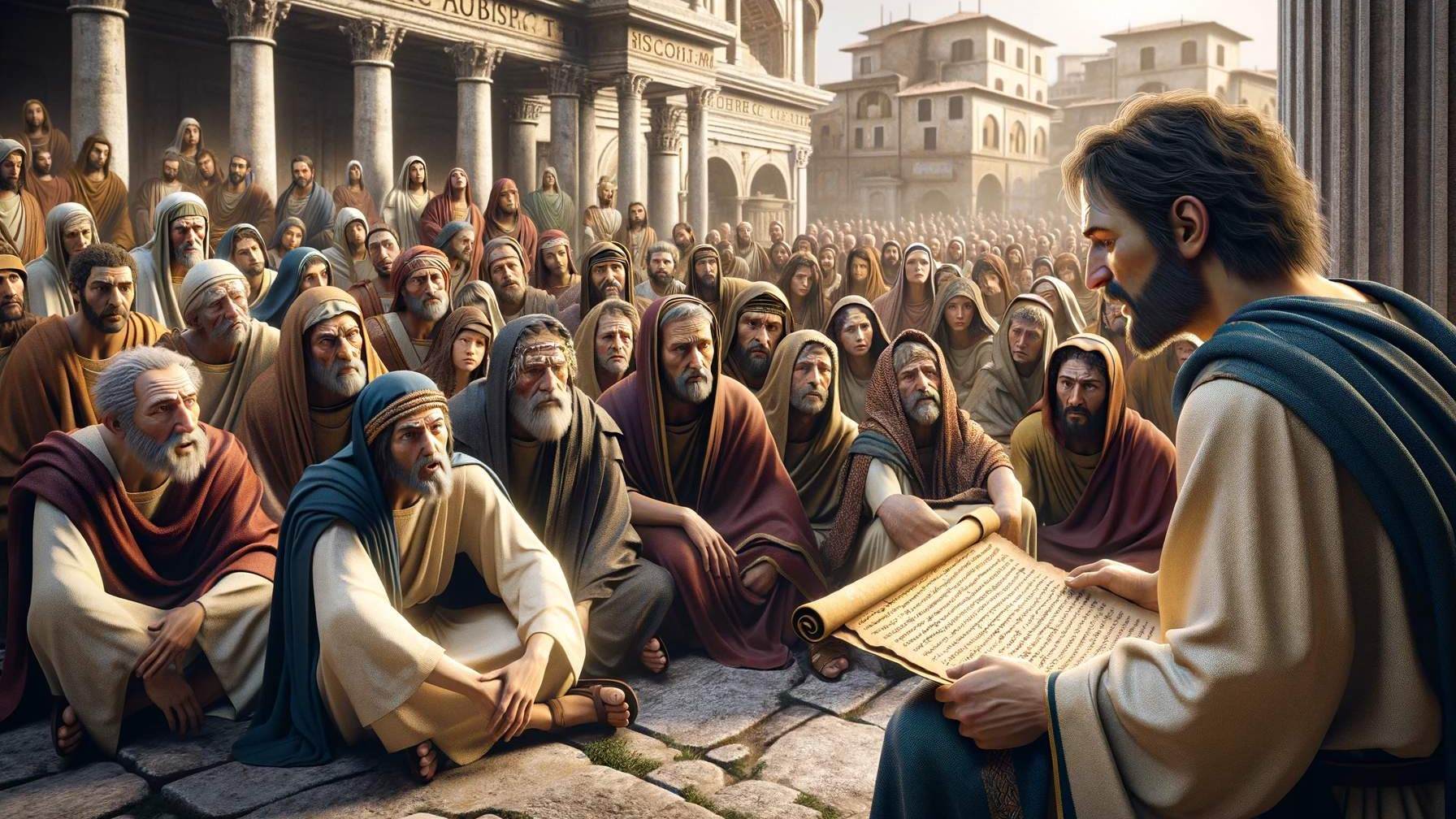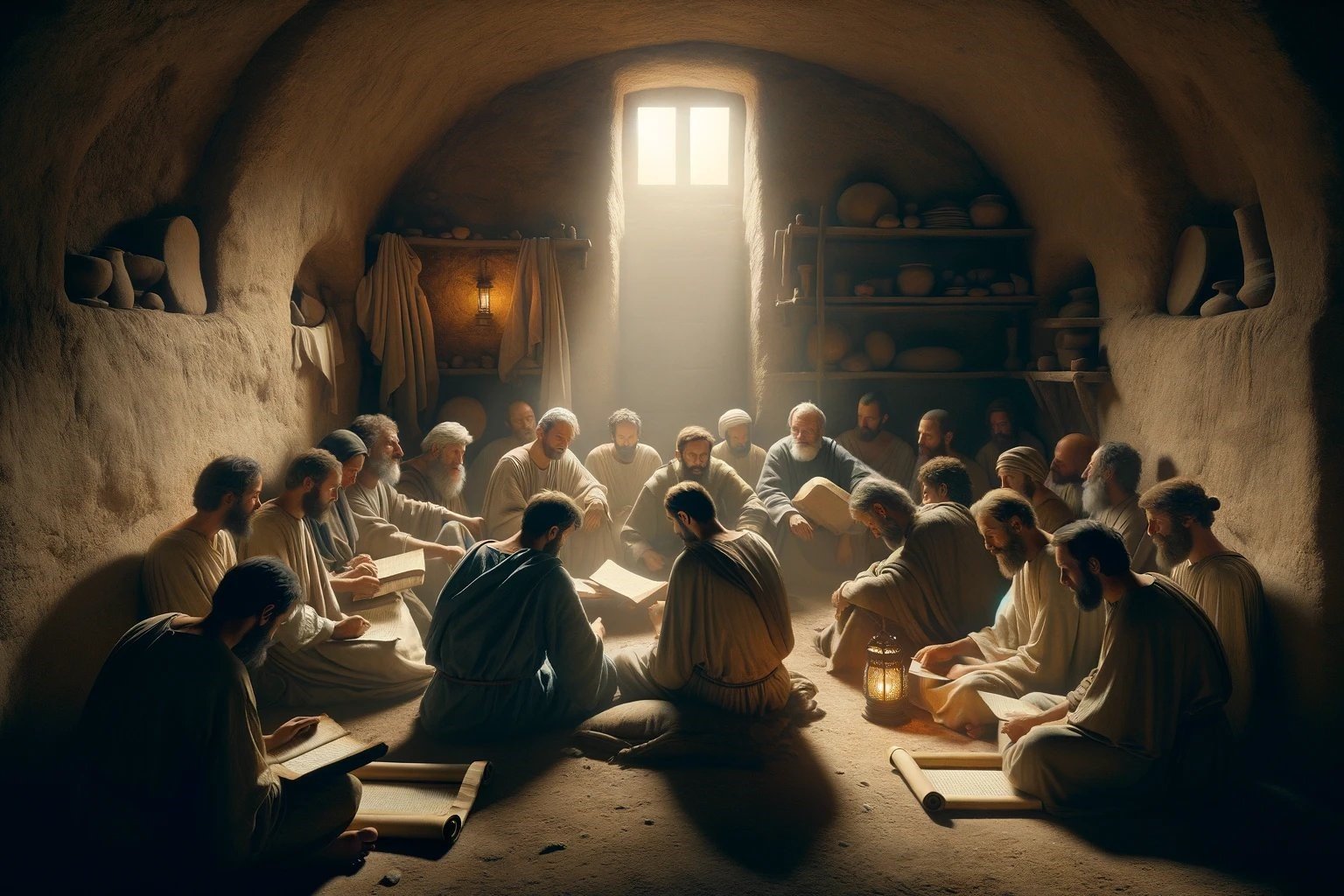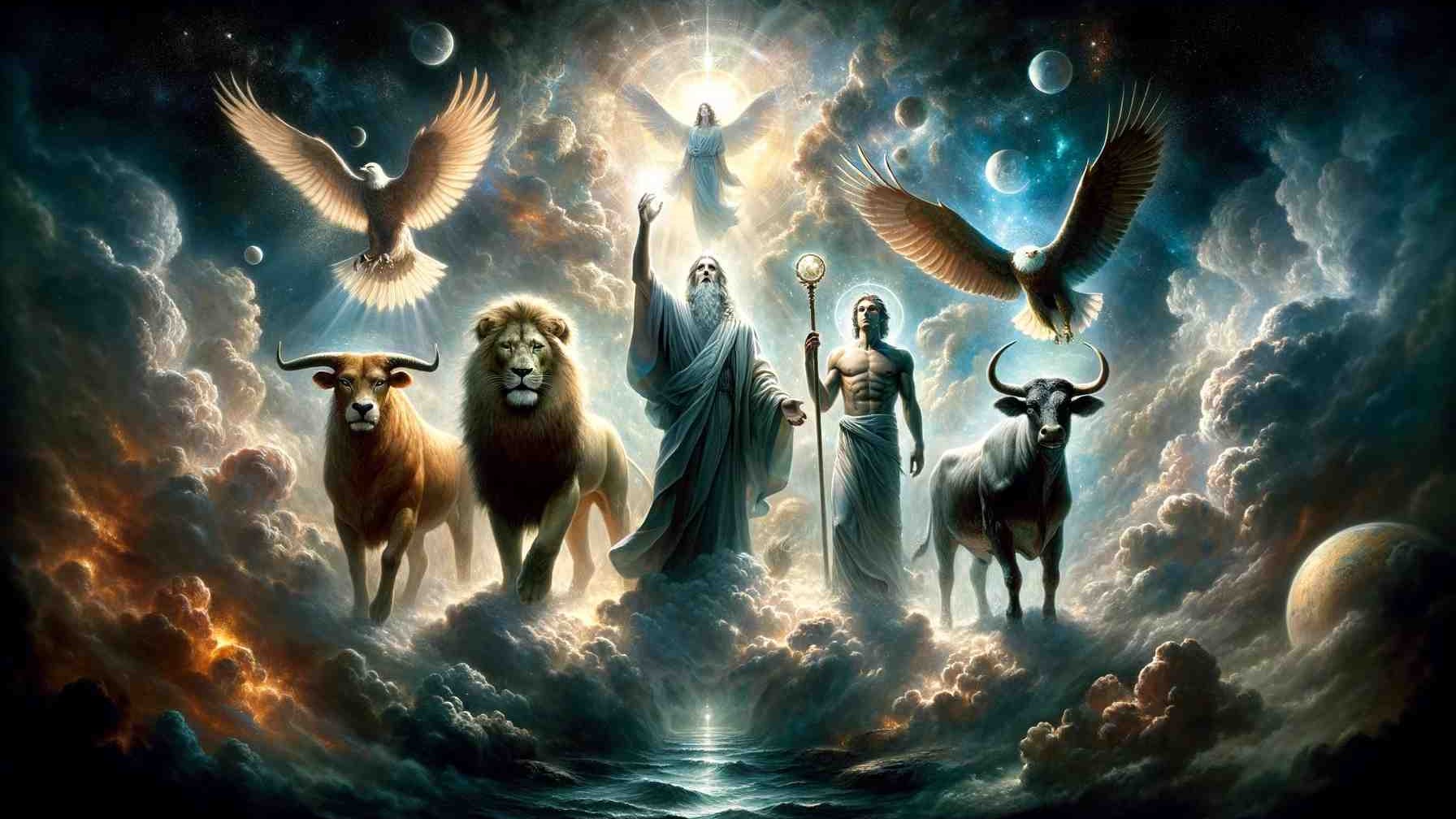Home>Bible Facts>What Is The Main Message Of The Book Of Revelation


Bible Facts
What Is The Main Message Of The Book Of Revelation
Published: February 11, 2024
Ericka Andersen, an editor at Christian.net, expertly merges digital strategy with content creation, focusing on faith and societal issues. Her communication skills enhance the platform's engaging narratives, fostering meaningful dialogue on belief's impact on society.
Discover the main message of the Book of Revelation and gain valuable insights into its significance and relevance in understanding Bible facts. Explore the key themes and teachings of this profound biblical text.
(Many of the links in this article redirect to a specific reviewed product. Your purchase of these products through affiliate links helps to generate commission for Christian.net, at no extra cost. Learn more)
Table of Contents
Introduction
The Book of Revelation, the final book of the New Testament, is a captivating and enigmatic piece of literature that has intrigued and inspired readers for centuries. Also known as the Apocalypse of John, this profound text offers a glimpse into the divine revelations received by the apostle John while exiled on the island of Patmos. Its vivid imagery, symbolic language, and prophetic messages have sparked intense debate and speculation, making it a subject of fascination for theologians, scholars, and believers alike.
As we delve into the main message of the Book of Revelation, it is essential to recognize the historical context in which it was written and the overarching themes that permeate its verses. This ancient text, composed during a period of intense persecution of early Christians, serves as a beacon of hope and encouragement for believers facing adversity. Its apocalyptic visions and eschatological themes provide a profound perspective on the ultimate triumph of good over evil and the fulfillment of God's divine plan for humanity.
The Book of Revelation stands as a testament to the enduring power of faith and resilience in the face of tribulation. Its rich tapestry of symbolism and allegory invites readers to contemplate profound truths about the nature of spiritual warfare, the sovereignty of God, and the ultimate destiny of creation. As we embark on this exploration of its main message, let us approach the text with open hearts and minds, ready to uncover the timeless wisdom and enduring relevance encapsulated within its pages.
Historical Context of the Book of Revelation
The historical context of the Book of Revelation is integral to understanding its profound significance and enduring impact. Authored by the apostle John, the book was composed during a tumultuous period in early Christian history. The Roman Empire, under the rule of Emperor Domitian, subjected Christians to brutal persecution, seeking to suppress the spread of the Christian faith. Against this backdrop of oppression and hostility, the Book of Revelation emerged as a source of solace and encouragement for beleaguered believers.
During John's exile on the island of Patmos, he received divine revelations that formed the basis of the apocalyptic visions recorded in the book. The persecution of Christians, coupled with the pervasive idolatry and immorality of the era, created an atmosphere of fear and uncertainty. In this context, the Book of Revelation served as a powerful testament to the sovereignty of God and the ultimate triumph of righteousness over evil.
The symbolic language and vivid imagery employed in the book resonated deeply with its original audience, offering hope and reassurance in the face of adversity. The seven churches addressed in the opening chapters of Revelation grappled with various challenges, including persecution, internal strife, and spiritual compromise. The letters to these churches reflected the real-life struggles and triumphs of early Christian communities, providing timeless insights into the enduring nature of faith and perseverance.
Furthermore, the historical context of the Book of Revelation underscores its relevance for contemporary readers. While the specific persecutions faced by early Christians may differ from present-day challenges, the overarching themes of spiritual warfare, divine justice, and the ultimate victory of God's kingdom remain profoundly pertinent. By delving into the historical milieu in which the book was written, we gain a deeper appreciation for its enduring message of hope, resilience, and unwavering faith in the face of adversity.
In essence, the historical context of the Book of Revelation serves as a compelling backdrop against which its timeless truths and prophetic visions unfold. By understanding the challenges and triumphs of the early Christian community, we can glean profound insights that resonate across the centuries, offering guidance and inspiration for believers navigating their own spiritual journeys.
Overview of the Book of Revelation
The Book of Revelation, often shrouded in mystery and intrigue, is a profound and visionary work that holds a unique place within the New Testament. Comprising 22 chapters, this apocalyptic text unfolds as a series of vivid and symbolic visions, offering a glimpse into the divine revelations received by the apostle John during his exile on the island of Patmos. The book opens with a powerful prologue, emphasizing its prophetic nature and the blessings bestowed upon those who heed its words.
The structure of Revelation is marked by a sequence of visions and symbolic imagery, conveyed through the use of seals, trumpets, and bowls, each unveiling profound truths about the unfolding of God's divine plan. The central figure of the book is Jesus Christ, depicted in his exalted and triumphant glory, guiding and overseeing the events that lead to the ultimate establishment of God's kingdom on earth.
The book is replete with rich symbolism, including the iconic Four Horsemen of the Apocalypse, the Beast and the False Prophet, the Woman and the Dragon, and the New Jerusalem. These symbols convey profound spiritual truths and offer a compelling portrayal of the cosmic battle between good and evil, culminating in the ultimate victory of righteousness and the defeat of all forces opposed to God's reign.
Revelation also presents a series of letters addressed to the seven churches of Asia, offering commendation, exhortation, and warnings tailored to their specific circumstances. These letters provide valuable insights into the challenges faced by early Christian communities and offer timeless principles for spiritual renewal and perseverance.
The overarching themes of judgment, redemption, and the ultimate triumph of God's kingdom permeate the book, offering a profound perspective on the unfolding of human history and the consummation of God's purposes. The climactic vision of the New Jerusalem, with its resplendent imagery of a new heaven and a new earth, serves as a powerful symbol of hope and renewal, inspiring believers to persevere in the face of adversity and remain steadfast in their faith.
In essence, the Book of Revelation stands as a testament to the enduring power of faith and resilience, offering a compelling portrayal of the cosmic drama between the forces of light and darkness. Its visionary imagery and profound insights continue to captivate and inspire readers, inviting them to contemplate the ultimate fulfillment of God's redemptive plan and the eternal hope that it offers to all who embrace its transformative message.
The Main Message of the Book of Revelation
The main message of the Book of Revelation can be encapsulated in the profound and enduring theme of divine sovereignty and the ultimate triumph of good over evil. At its core, Revelation offers a compelling portrayal of the cosmic battle between the forces of light and darkness, culminating in the establishment of God's eternal kingdom and the fulfillment of His redemptive purposes. Through its vivid imagery and symbolic language, the book conveys a message of hope, perseverance, and unwavering faith in the face of adversity.
Central to the main message of Revelation is the exalted and triumphant figure of Jesus Christ, depicted as the Lamb who was slain and yet reigns victorious. This portrayal underscores the overarching theme of divine sovereignty, emphasizing that God remains in control of human history and the ultimate destiny of creation. The book's apocalyptic visions serve to reassure believers that, despite the trials and tribulations they may face, God's purposes will ultimately prevail, and His justice will be fully realized.
Furthermore, Revelation conveys a message of encouragement and steadfastness in the midst of persecution and spiritual warfare. The letters to the seven churches of Asia, interspersed throughout the book, offer timeless principles for spiritual renewal and perseverance, underscoring the importance of remaining faithful in the face of adversity. The book's vivid portrayal of the ultimate victory of God's kingdom serves as a source of hope and assurance for believers, inspiring them to endure and remain steadfast in their faith, knowing that their ultimate vindication lies in the hands of a sovereign and just God.
Moreover, the Book of Revelation conveys a message of eschatological hope, pointing to the ultimate consummation of God's redemptive plan and the establishment of a new heaven and a new earth. The vision of the New Jerusalem, with its resplendent imagery of a city adorned as a bride, symbolizes the ultimate union between God and His people, ushering in an era of eternal fellowship and divine presence. This vision serves as a powerful reminder that, despite the trials and tribulations of the present age, a glorious and unshakable future awaits those who remain faithful to the end.
In essence, the main message of the Book of Revelation resonates across the centuries, offering timeless truths and enduring hope to believers of every generation. Its profound themes of divine sovereignty, perseverance in the face of adversity, and the ultimate triumph of God's kingdom continue to inspire and uplift, inviting readers to embrace its transformative message and find solace in the unchanging promises of a faithful and victorious God.
Conclusion
In conclusion, the Book of Revelation stands as a testament to the enduring power of faith and resilience in the face of adversity. Its profound and visionary message transcends the boundaries of time and space, offering timeless insights and enduring hope to believers across generations. Through its rich tapestry of apocalyptic visions, symbolic imagery, and profound theological truths, Revelation conveys a message of divine sovereignty, eschatological hope, and the ultimate triumph of God's kingdom over the forces of darkness.
The historical context of the book, set against the backdrop of intense persecution and spiritual warfare faced by early Christians, underscores the relevance and enduring significance of its message. The letters to the seven churches of Asia, with their exhortations, warnings, and promises, offer timeless principles for spiritual renewal and perseverance, resonating with believers navigating their own trials and tribulations.
The main message of Revelation revolves around the exalted figure of Jesus Christ, the Lamb who was slain and yet reigns victorious, symbolizing the ultimate triumph of sacrificial love and divine redemption. The book's portrayal of the cosmic battle between good and evil, culminating in the establishment of a new heaven and a new earth, serves as a source of hope and assurance for believers, inspiring them to remain steadfast in their faith and unwavering in their commitment to God's eternal purposes.
As we reflect on the enduring message of the Book of Revelation, we are reminded of the unchanging promises of a faithful and victorious God. Its profound themes of divine sovereignty, perseverance in the face of adversity, and the ultimate fulfillment of God's redemptive plan continue to inspire and uplift, inviting readers to embrace its transformative message and find solace in the unshakable hope it offers.
In essence, the Book of Revelation invites us to contemplate the ultimate victory of God's kingdom, the restoration of all things, and the eternal fellowship between God and His people. Its message transcends the confines of a specific historical context, speaking directly to the human experience and offering a vision of hope, renewal, and unending triumph. As we journey through the enigmatic and profound pages of Revelation, we are beckoned to embrace its transformative message and find solace in the unchanging promises of a faithful and victorious God.















